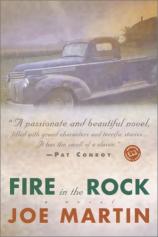Reading Group Guide
Discussion Questions
Fire in the Rock

1. Thinking that Bo has "turned him in" for his flirtations with Mae Maude, Pollo runs away when he hears sirens. When Bo realizes this, he sees for the first time the complications of their friendship. "I wanted to call out to him across the distance, wanted to take his hand and wanted to hit him at the same time, wanted to set us free, wanted to sing I went to the rock to hide my face, but the porch and the whole world fell silent. . . . And I did not then and do not now know how to set it free." Discuss Bo's mixed emotions at this moment. What emotion do you think was the strongest? Hurt? Shame? Anger?
2. Bubba Wilson rolls into town and brings with him many unpleasant realities for Bo, the most obvious being his cruel racism. But there are other reasons that Bo hates and fears Bubba. What are they?
3. What is the importance of Pollo's fascination with Kulonga in the Tarzan novels? How does this differ from his fascination with mythology? How is it similar?
4. Discuss the impact on Pollo of his discovery that the residents of the settlement at the Rocks weren't the only African Americans in the world.
5. Describe Bo's first experience attending the movies with Pollo. Explain the social significance of "Heaven" and compare this to his view of it through the eyes of a teenage boy.
6. When Mae Maude tells Bo "He raped me," Bo concludes that she means Pollo. What was your initial conclusion?
7. The cross that the Klan puts up at the end of the swimming dock symbolizes the end of the idyllic summer and the end of innocence for Bo, Pollo, and Mae Maude. When Bo tells Delphine Templeton that he had nothing to do with the cross she replies, "We all had something to do with it." Discuss individual culpability of Bo, Pollo, and Mae Maude for the tragic events that took place. How does Miss Templeton see herself responsible?
8. The events leading up to Pollo's (Reverend Paul Templeton) arrest depict great strength and bravery on the part of the settlement at the Rocks. But this cost Joe Douglas his life. What else did it cost the community? What did it cost Pollo personally?
9. Pollo tells Bo that Pollo has died and his new name is Paul Templeton. What else has changed about Pollo? How is he the same? Does Bo still see the same things he admired in Pollo that summer ten years earlier?
10. What is the significance of Pollo naming his youth center The Oracle? Why does he change the name?
11. "There was a saying at home that in the North, whites said to black people: 'Rise as high as you want to, but don't come any closer,' while people in the South said: 'Come as close as you want to, but don't rise any higher.' " What is your interpretation of this saying?
12. When Bo travels to Philadelphia with Pollo he feels for the first time what it's like to be treated badly because of racial stereotypes. How does this trip change his relationship with Pollo?
13. Throughout the book several "corpses" are dug up, from the first in Mae Maude's backyard, to the truth about the fire at Centennial College. Discuss the significance of some of the "smaller" truths leading up to the big discovery about Samuel Dubois.
14. Do you think that Bo and Pollo made the right decision in setting Samuel Dubois free from his secret? In the end do you think he was better off?
15. Imagine your most basic rights being taken away . . . how would you feel? How would this differ if you had grown up without these rights? What would you risk to obtain your civil rights?
16. Discuss racism today . . . how have things changed and how have they remained the same?
Fire in the Rock
- Publication Date: March 4, 2003
- Paperback: 272 pages
- Publisher: Ballantine Books
- ISBN-10: 0345456912
- ISBN-13: 9780345456915






